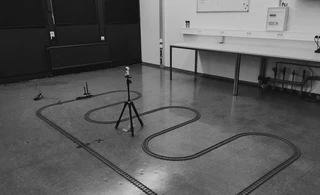Improving the Robustness of Control-Grade Ultra-Wideband Localization
Jun 26, 2018· ,,,·
0 min read
,,,·
0 min read
Janis Tiemann
Lucas Koring
Philipp Gorczak
Christian Wietfeld
 Illustration of the proposed concept. The local- ization filter is augmented with inertial measurement and signal quality data to improve the robustness.
Illustration of the proposed concept. The local- ization filter is augmented with inertial measurement and signal quality data to improve the robustness.Abstract
Ultra-wideband based localization technologies gained more and more attention over the recent years. Most of the predominant research focusses on two-way ranging based system topologies that feature limited multi-user scalability. This work aims to improve the accuracy and robustness of a highly scalable control-grade time-difference of arrival based localization system. The specific goal addressed in this work is to improve the robustness under non-line-of-sight conditions using ultra-wideband specific signal quality assessment and inertial sensor fusion. The accuracy of the proposed method is experimentally analyzed in two experiments. One experiment evaluates the performance under best-case conditions. A second experiment introduces strong interference through moving assets. Here, an accuracy improvement of over 60 % could be achieved compared to previous results. In order to relate those results, an experimental comparison to a widely used angle of arrival capable state of the art ultra-wideband localization system is made. It could be shown that the proposed method is more accurate than the state of the art in the strong interference scenario.
Type
Publication
In 3rd IFAC Conference on Embedded Systems, Computer Intelligence and Telematics, Faro, Portugal